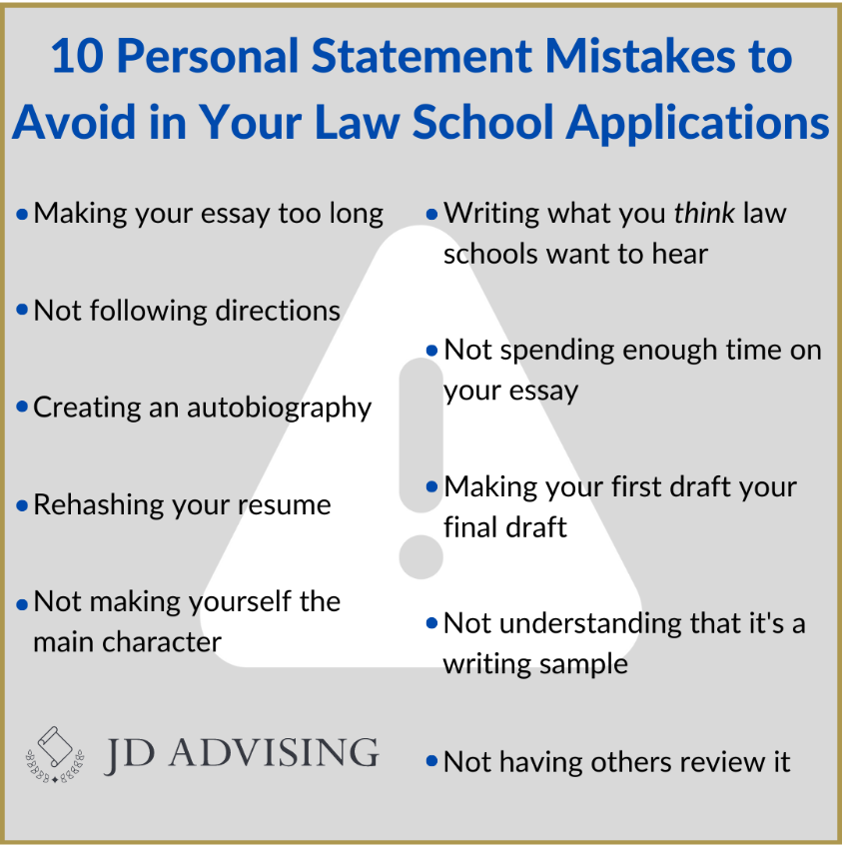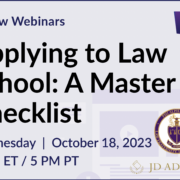10 Personal Statement Mistakes To Avoid In Your Law School Applications
10 Personal Statement Mistakes To Avoid In Your Law School Applications
Writing your law school personal statement is incredibly difficult for most applicants. The law school prompts are vague and open-ended, yet the essay is a critical component in a school’s decision to admit someone. Since most schools don’t conduct admissions interviews, the personal statement essentially serves as the interview. While that may sound like a lot of pressure, don’t let it stress you out! It’s one of the few documents in your application that you have complete control over so you can take your time and craft the perfect essay. In crafting your personal statement, avoid these all-to-common mistakes!
10 Personal Statement Mistakes To Avoid In Your Law School Applications
Personal Statement Mistake #1: Making Your Essay Too Long
The first personal statement mistake you’ll want to avoid is making your essay too long. It’s hard to keep such an important essay succinct, especially when most schools require it to be limited to two or three pages double-spaced. Sharing a compelling narrative about who you are, what makes you unique, your goals, and what brought you to law school is a huge task to undertake in one essay. Condensing your statement to a couple of pages can feel impossible. This is why many applicants find themselves with essays that are too long.
If you find yourself in this position, take a step back and try to evaluate your essay. Break it down into sections. Ask yourself, what does each part of your essay say about you as an applicant? Does it highlight something new about you or repeat a sentiment found elsewhere? Is something a necessary part of the essay or does the essay feel the same without it? Going through this sort of exercise will help you find ways to trim your essay to avoid one of the very common personal statement mistakes of making it too long.
Personal Statement Mistake #2: Not Following Directions
Part of why it’s important keep your personal statement in the space allotted is because it shows that you can follow directions. Skipping over the instructions is a huge no-no! If a law school lays out specific requirements for your essay (which usually focus on page limits, font size, margin sizes, etc.) be sure to avoid the pitfall of not complying with those rules.
Often students don’t intentionally make the mistake of not following directions, but with so many differing school requirements, they don’t realize there may be school-specific requirements they are not complying with. Other students sometimes knowingly make this mistake by thinking that their essay will be stronger if it were longer, so they submit a non-compliant essay.
Avoid this personal statement mistake! Admissions Offices read thousands of essays. They know just from glancing at the document whether it’s in the required size font, margins, or length (that one’s more obvious). This won’t get passed them unnoticed.
Ultimately, not following directions is a poor reflection on you and your attention to detail – a necessary skill as a lawyer, so be sure to follow each school’s directions carefully to ensure you’re complying with their requirements.
Personal Statement Mistake #3: Creating an Autobiography
While the personal statement is an essay that focuses exclusively on the applicant, do not make the mistake of thinking this is your chance to write an autobiography. Avoid the mistake of thinking you should recap your entire life since birth. That is not the intention of the essay! That is not what Admissions Offices need to know. And, frankly, you don’t have the space to do this!
Instead, reflect on important moments throughout your life that were transformative or pivotal in you becoming the person you are today. What stands out to you? What set you on the path you’re now on? What rooted your interest in law or made you the person you are today? Look for themes and craft your essay around your answers to these questions.
Personal Statement Mistake #4: Rehashing Your Resume
While it may seem obvious to not write an autobiography in your personal statement, far more applicants fall victim to this next personal statement mistake: rehashing their resume in their essay.
Remember, all your application documents are read together and should be complementary to one another. You do not need to restate all your professional experiences in your personal statement because the reader has likely already reviewed your resume just minutes earlier. Your personal statement is an opportunity to showcase new information to the reader that isn’t already apparent elsewhere in your application.
Note that it’s perfectly fine to discuss an experience in your personal statement that also appears on your resume. But pick out just one or two experiences from your resume and dive into more details in the essay. Your resume may highlight what you accomplished in a particular role but if you choose to write about this experience in your essay, it should focus on why it was so important or impactful for you. This is information that would not be on your resume and thus, great to write about in your personal statement.
Personal Statement Mistake #5: Not Making Yourself the Main Character
Avoid the mistake of not making the personal statement, well, personal. You must be the main character in your personal statement! Don’t focus the essay on a difficult time your friend, family, or neighbor went through. Though that would make a compelling essay for them, it doesn’t tell the reader anything about you.
Many applicants make this writing mistake when they don’t feel like they have anything interesting to write about themselves. In this case, they lean on the life experience of others that they find are much more exciting. Avoid this personal statement mistake!
The essay is of no value if it doesn’t tell the reader anything about you. If you choose to share part of another person’s story in your essay, that’s okay. However, you must be sure that the focus remains on you.
Think about how this other person’s experience impacted your life. How did it make you feel? Did it change the way you lived knowing someone so close to you went through something so challenging?
Making sure you are the main character in your essay does not mean you can’t mention other people at all. Instead, just be sure to tweak the lens through which the essay is written so that you remain the focus and not anyone else. This is your story to tell.
Personal Statement Mistake #6: Writing What You Think Law Schools Want To Hear
There’s not one specific thing that law schools are looking for in candidates. In fact, it’s quite the opposite. Schools look to bring in a diverse group of students from all walks of life with differing experiences. Remember this when writing your personal statement and avoid trying to write what you think law schools want to hear.
Embrace what makes you unique. Lean into your mistakes and the lessons you’ve learned from them. You don’t need to have been a model student or citizen to get accepted to an amazing law school. Those flaws can be part of what makes your story so compelling. (Remember, of course, that the important piece here is the lessons you’ve learned from your mistakes and the growth you’ve experienced.)
Personal Statement Mistake #7: Not Spending Enough Time On Your Essay
This is one of the biggest personal statement mistakes, and so many applicants fall victim to it! They simply do not spend enough time on their personal statement! This includes brainstorming, writing, and editing it. All these phases of the writing process take time. You should not rush this process, so make sure you allot enough time to it.
This doesn’t mean that you need to spend a year writing your essay or, inversely, that it can’t be done in a week. There’s no length of time you need to spend writing your personal statement, but I always suggest giving yourself at least a few weeks to craft a great essay.
This timeline includes a period to just think about the essay. Read the prompts and let ideas percolate in your mind. There’s no active work you’re doing here. Instead, you’re merely beginning the brainstorming process.
If you don’t dedicate enough time to the essay in the brainstorming phase, you’re not likely to have a good final product, irrespective of the amount of backend editing done. Invest in making sure your topic is the best possible choice for this essay.
Personal Statement Mistake #8: Making Your First Draft Your Final Draft
Relatedly to the personal statement mistake above, your first draft of your personal statement should never EVER (ever!) be your final draft. And rarely, if ever, is your second or third draft your final draft either. Just because you could write an essay in one sitting and get an “A” in undergrad does not mean that same approach should be applied to the personal statement.
As part of your writing process, you should have multiple drafts of your essay, sometimes even on different topics or narratives. You should flesh out multiple ideas before deciding which one to move forward with. That alone should take up a couple of essay drafts.
Personal Statement Mistake #9: Not Understanding That It’s a Writing Sample
The next personal statement mistake is one often overlooked. Students forget that their essay isn’t merely a personal statement. It is also serving as a writing sample. Therefore, the essay needs to be 100% error-free. Unlike an exam for a class that might need to be written under time constraints where errors can be overlooked, no such limitations apply to this essay. You should dedicate all the time necessary to making sure this essay is as close to perfect as possible.
Personal Statement Mistake #10: Not Having Others Review It
Lastly, avoid the mistake of not having others review your essay. While the essay serves as a sample of your own work and a reflection of your life, law schools expect that others have reviewed it for you. Share drafts of your essay with others at each step of the writing process. Gather feedback on topic choice. Discuss with those close to you whether the essay conveys the essence of who you are. And, of course, have others check for grammatical or punctuation errors.
For more information on how to avoid these law school personal statement mistakes and others, check out our personal statement writing packages and other law school prep offerings.











Leave a Reply
Want to join the discussion?Feel free to contribute!